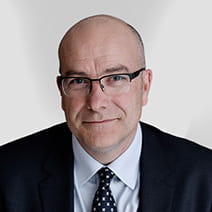Our latest Stocktake looks at American medical technology company Edwards Lifesciences, a holding in the ‘Enabling innovation in healthcare’ sustainable investment theme. This theme aims to find companies providing step changes in the way science discovers and creates therapies, or directly in the treatments of patients themselves.
World Heart Day, observed annually on 29th September, serves as a global reminder of the importance of heart health and the urgency of combating cardiovascular diseases (CVDs). With cardiovascular diseases being the leading cause of death worldwide[1], the day – created by the World Heart Federation in 2000 – highlights the need for preventive measures, lifestyle changes, and medical innovations to reduce the burden of heart disease.
Heart disease is becoming more common as the global population ages. The number of people aged 60 and over is expected to double by 2050, reaching 2.1 billion[2]. This trend highlights the growing need for healthcare systems to adapt, and for innovations that can manage the needs of patients more effectively.
Innovation in healthcare: A key sustainable investment theme
Our Enabling Innovation in Healthcare theme highlights companies revolutionising the discovery and creation of therapies, enhancing clinicians’ ability to diagnose and treat patients more effectively. These companies span the healthcare industry, introducing new methods for drug research and discovery, and improving doctors’ diagnostic capabilities. Their innovations typically lead to better patient outcomes, including more effective treatments, improved surgical results, faster and more accurate diagnoses, and higher quality care.
Given the prevalence of heart disease, the need for healthcare innovation is vital. These advancements are not only crucial for improving patient outcomes but also for ensuring the long-term sustainability of healthcare systems. The increasing demand for healthcare services, combined with rising costs, puts pressure on governments, healthcare providers, and the pharmaceutical industry to find cost-effective solutions that deliver better results.
Innovative heart valve technologies – Edwards Lifesciences
Edwards Lifesciences, a holding within our global and US portfolios, is a global leader in both surgical heart valves and transcatheter aortic valve replacement (TAVR). By expanding access to life-saving heart valve replacements, Edwards Lifesciences has played a pivotal role in lowering mortality rates associated with heart valve disease. The majority of revenues today come from its TAVR product, which is a minimally invasive alternative to open heart surgery to treat patients suffering from a disease called aortic stenosis.
Aortic stenosis is a condition predominantly affecting the elderly and is degenerative; the condition worsens as the patient ages. The current standard of care to treat aortic stenosis is open heart surgery, however, many patients are too old and frail to undergo such an invasive procedure.
Transcatheter aortic valve replacement (TAVR) allows for valve replacement through a catheter which is fed into an artery in the patient’s leg. This can then be fed up through the body into the heart and when it is in position, a tiny balloon inflates the valve to secure it. This less invasive process has opened up treatment options for high-risk patients who previously had no viable solution, significantly reducing their risk of death from untreated aortic stenosis. In fact, the company claims that over the past decade, the TAVR adoption has doubled the treatment rate of Aortic Stenosis patients and so far it has treated over 1 million people.[3]
We have held the company in our US fund since its launch in July 2023. Towards the end of the year, we observed a decline in the share price due to a misplaced belief that high-profile weight-loss drugs would reduce demand for Edwards’ products. Given that aortic valve stenosis is primarily a degenerative disease and considering the global growth in aging populations, we saw this as an opportune moment to increase our holding and to also start a position in our Global fund.
The company disappointed the market at its latest quarterly earnings in July, explaining that it expected growth in its core TAVR product to be slower this year than previously expected. Following this aggressive sell off in the share price, the company has repurchased more than $1billion of its own shares. Our confidence in the longer-term recovery of this segment, as well as the early successes we are seeing them have in other areas in cardiology gave us confidence to add to our position at what we felt was an attractive valuation.
The growing need for investment and innovation in healthcare
World Heart Day serves as a powerful reminder of the importance of heart health and the urgent need for continued innovation in healthcare. Companies like Edwards Lifesciences demonstrate how innovation can lead to better patient outcomes, more efficient healthcare systems, and ultimately, a more sustainable future. With the world’s population aging and heart disease rates rising, the demand for innovative healthcare solutions will only grow. Therefore, investment in healthcare innovation is critical for improving global health and ensuring that healthcare systems that can manage the complex needs of older patients more effectively.
[1] The Heart of the World - PMC (nih.gov)
[2] Ageing and health (who.int)
[3] 2023 Investor Conference Webcast – December 2023
KEY RISKS
Past performance is not a guide to future performance. The value of an investment and the income generated from it can fall as well as rise and is not guaranteed. You may get back less than you originally invested.
The issue of units/shares in Liontrust Funds may be subject to an initial charge, which will have an impact on the realisable value of the investment, particularly in the short term. Investments should always be considered as long term.
The Funds managed by the Sustainable Future Team:
Are expected to conform to our social and environmental criteria. May hold overseas investments that may carry a higher currency risk. They are valued by reference to their local currency which may move up or down when compared to the currency of a Fund. May hold Bonds. Bonds are affected by changes in interest rates and their value and the income they generate can rise or fall as a result; The creditworthiness of a bond issuer may also affect that bond's value. Bonds that produce a higher level of income usually also carry greater risk as such bond issuers may have difficulty in paying their debts. The value of a bond would be significantly affected if the issuer either refused to pay or was unable to pay. May encounter liquidity constraints from time to time. The spread between the price you buy and sell shares will reflect the less liquid nature of the underlying holdings. Outside of normal conditions, may hold higher levels of cash which may be deposited with several credit counterparties (e.g. international banks). A credit risk arises should one or more of these counterparties be unable to return the deposited cash. May be exposed to Counterparty Risk: any derivative contract, including FX hedging, may be at risk if the counterparty fails. May invest in companies listed on the Alternative Investment Market (AIM) which is primarily for emerging or smaller companies. The rules are less demanding than those of the official List of the London Stock Exchange and therefore companies listed on AIM may carry a greater risk than a company with a full listing. May invest in smaller companies and may invest a small proportion (less than 10%) of the Fund in unlisted securities. There may be liquidity constraints in these securities from time to time, i.e. in certain circumstances, the fund may not be able to sell a position for full value or at all in the short term. This may affect performance and could cause the fund to defer or suspend redemptions of its shares.
The risks detailed above are reflective of the full range of Funds managed by the Sustainable Future Team and not all of the risks listed are applicable to each individual Fund. For the risks associated with an individual Fund, please refer to its Key Investor Information Document (KIID)/PRIIP KID.
DISCLAIMER
This is a marketing communication. Before making an investment, you should read the relevant Prospectus and the Key Investor Information Document (KIID), which provide full product details including investment charges and risks. These documents can be obtained, free of charge, from www.liontrust.co.uk or direct from Liontrust. Always research your own investments. If you are not a professional investor please consult a regulated financial adviser regarding the suitability of such an investment for you and your personal circumstances.
This should not be construed as advice for investment in any product or security mentioned, an offer to buy or sell units/shares of Funds mentioned, or a solicitation to purchase securities in any company or investment product. Examples of stocks are provided for general information only to demonstrate our investment philosophy. The investment being promoted is for units in a fund, not directly in the underlying assets. It contains information and analysis that is believed to be accurate at the time of publication, but is subject to change without notice. Whilst care has been taken in compiling the content of this document, no representation or warranty, express or implied, is made by Liontrust as to its accuracy or completeness, including for external sources (which may have been used) which have not been verified. It should not be copied, forwarded, reproduced, divulged or otherwise distributed in any form whether by way of fax, email, oral or otherwise, in whole or in part without the express and prior written consent of Liontrust.














